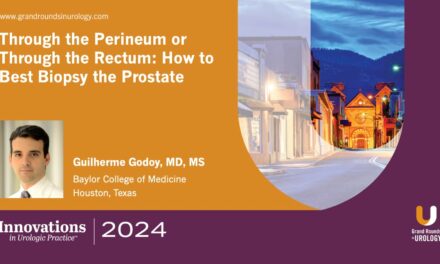Robert E. Reiter, MD, presented “Neoadjuvant Trials in High Risk Prostate Cancer: A Must Do for the Field” during the Perspectives in Urology: Point Counterpoint 2020 virtual conference in November 2020.
How to cite: Reiter, Robert E. “Neoadjuvant Trials in High Risk Prostate Cancer: A Must Do for the Field” November 2020. Accessed Nov 2025. https://grandroundsinurology.com/neoadjuvant-trials-in-high-risk-prostate-cancer-a-must-do-for-the-field/
Neoadjuvant Trials in High Risk Prostate Cancer: A Must Do for the Field – Summary
Robert E. Reiter, MD, MBA, Bing Professor of Urology and Molecular Biology and Director of the Prostate Cancer Treatment and Research Program at the David Geffen School of Medicine at the University of California, Los Angeles, and Principal Investigator of UCLA’s SPORE (Specialized Program in Research Excellence) program, argues for supporting neoadjuvant trials in high-risk prostate cancer as a key way to improve treatment results. He explains that ⅓ of high-risk patients die from their cancer, citing this as evidence that high-risk prostate cancer management must improve. Dr. Reiter then reviews several trials, beginning with CaLGB 90203, a neoadjuvant chemohormonal therapy study which found that over the course of ten years neoadjuvant patients experienced an 80% survival probability, while patients who were treated with only surgery experienced a 74% survival probability. He analyzes an assortment of phase II trials exploring whether more intensive androgen ablation can improve the short-term results of, for example, pathologic complete responses. These trials found that the complete response rates increased from 4% to 14% over the course of 12 weeks with no biochemical recurrences. Dr. Reiter continues by drawing attention to the current phase 3 PROTEUS trial, which should clarify whether or not pathologic complete response is a valid endpoint. He concludes with a discussion of the beneficial findings of pure translational neoadjuvant studies.
The con perspective of this point-counterpoint series will be published next week on GRU.
About the Perspectives in Urology: Point Counterpoint 2020 virtual conference:
Presented by Program Chair and Grand Rounds in Urology Editor-in-Chief E. David Crawford, MD, as well as Program Co-Chair Dan Theodorescu, MD, PhD, this virtual conference brought together leading experts in urology, medical oncology, and radiation oncology to discuss and debate the latest topics in genitourinary cancers, primarily prostate cancer and bladder cancer. This two-day interactive conference offered topical lectures, pro/con debates, interesting-case presentations, interactive panel discussions, and interactive audience and faculty networking. A focus on prostate cancer was given on Wednesday, November 11th, with a focus on bladder cancer given on Thursday, November 12th.
ABOUT THE AUTHOR
Robert E. Reiter, MD, MBA, is the Bing Professor of Urology and Molecular Biology and Director of the Prostate Cancer Treatment and Research Program at the David Geffen School of Medicine at the University of California, Los Angeles. He is currently the Principal Investigator of UCLA’s SPORE (Specialized Program in Research Excellence) program, a $12 million research grant from the National Cancer Institute to develop new diagnostic and treatment options for men with prostate cancer. Dr. Reiter’s clinical interests include robotic surgical management of prostate cancer and the use of both MRI and molecular imaging tools to manage this disease. His research is focused on the development of novel antibodies for both treatment and imaging of prostate cancer, as well as on the role of epithelial to mesenchymal transition in castration and treatment resistance. Dr. Reiter completed his undergraduate studies at Yale University and earned his medical degree at Stanford University Medical School.


